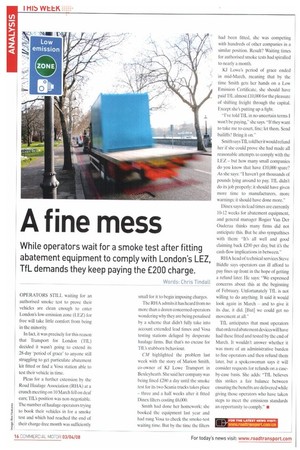A fine mess
Page 16

If you've noticed an error in this article please click here to report it so we can fix it.
While operators wait for a smoke test after fitting abatement equipment to comply with London's LEZ, TfL demands they keep paying the £200 charge.
Words: Chris Tindall
OPERATORS STILL waiting for an authorised smoke test to prove their vehicles are clean enough to enter London's low-emission zone (LEZ) for free will take little comfort from being in the minority.
In fact, it was precisely for this reason that Transport for London (TIL) decided it wasn't going to extend its 28-day 'period of grace' to anyone still struggling to get particulate abatement kit fitted or find a Vosa station able to test their vehicle in time.
Pleas for a further extension by the Road Haulage Association (RHA) at a crunch meeting on 10 March fell on deaf ears; TIL's position was non-negotiable. The number of haulage operators trying to book their vehicles in for a smoke test and which had reached the end of their charge-free month was sufficiently small for it to begin imposing charges.
The RHA admits it has heard from no more than a dozen concerned operators wondering why they are being penalised by a scheme that didn't fully take into account extended lead times and Vosa testing stations deluged by desperate haulage firms. But that's no excuse for TfL's stubborn behaviour.
CM highlighted the problem last week with the story of Marion Smith, co-owner of KJ Lowe Transport in Bexleyheath. She said her company was being fined £200 a day until the smoke test for its two Scania trucks takes place three and a half weeks after it fitted Dinex filters costing £6,000.
Smith had done her homework; she booked the equipment last year and had rung Vosa to check the smoke-test waiting time. But by the time the filters had been fitted, she was competing with hundreds of other companies in a similar position. Result? Waiting times for authorised smoke tests had spiralled to nearly a month.
KJ Lowe's period of grace ended in mid-March, meaning that by the time Smith gets her hands on a Low Emission Certificate, she should have paid TfL almost £10,000 for the pleasure of shifting freight through the capital. Except she's putting up a fight.
"I've told TfL in no uncertain terms I won't be paying," she says. "If they want to take me to court, fine; let them. Send bailiffs? Bring it on."
Smith says TfL told her it would refund her if she could prove she had made all reasonable attempts to comply with the LEZ but how many small companies do you know that have £10,000 spare? As she says: "I haven't got thousands of pounds lying around to pay. TfiL didn't do its job properly; it should have given more time to manufacturers, more warnings; it should have done more."
Dinex says its lead times are currently 10-12 weeks for abatement equipment, and general manager Rogier Van Der Ouderaa thinks many firms did not anticipate this. But he also sympathises with them: "It's all well and good claiming back £200 per day, but it's the cash-flow implications in between."
RHA head of technical services Steve Biddle says operators can ill afford to pay fines up front in the hope of getting a refund later. He says: "We expressed concerns about this at the beginning of February. Unfortunately TfL is not willing to do anything. It said it would look again in March and to give it its due, it did. [But] we could get no movement at all."
TfL anticipates that most operators that ordered abatement devices will have had these fitted and tested by the end of March. It wouldn't answer whether it was more of an administrative burden to fine operators and then refund them later, but a spokeswoman says it will consider requests for refunds on a caseby-case basis. She adds: "TfL believes this strikes a fair balance between ensuring the benefits are delivered while giving those operators who have taken steps to meet the emissions standards an opportunity to comply." •
















































































































































































